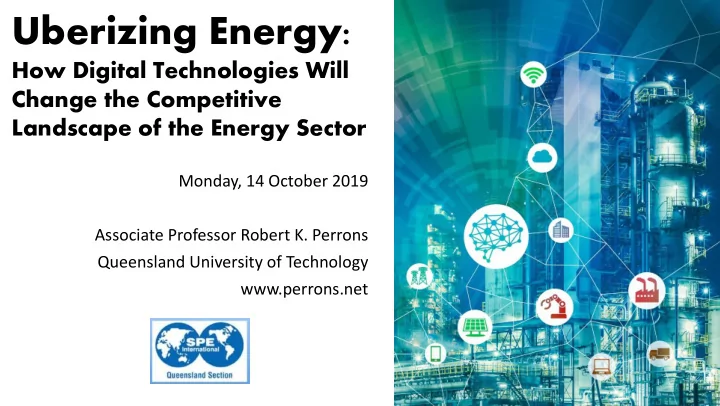

Uberizing Energy: How Digital Technologies Will Change the Competitive Landscape of the Energy Sector Monday, 14 October 2019 Associate Professor Robert K. Perrons Queensland University of Technology www.perrons.net
Who am I? • Since 2011, Associate Professor at Queensland University of Technology • Before that, Shell International E&P • Executive Coordinator of global R&D portfolio • Smart Fields digital oilfield program • PwC Chair in Digital Economy , projects with and • Member of United Nations Expert Group – Resources and Energy • Serve in Australian Government’s “Expert Network” to provide advice on emerging energy technologies, and adviser to MIT’s Mining, Oil & Gas Club, several energy and resource sector tech startups around the world
SPE Global Innovation Surveys • We led the global surveys in 2012 and in 2017 • Spent years evangelizing and sharing 2012 results • Examined at how innovation happens in global E&P industry at business unit level • Just about to publish the 2017 results • This time, looking at individual level innovation
Overview • Why talk about Uber? • What technological advances are contributing to these new marketplace dynamics? • How are value networks and industries being reconfigured by these technological changes? • What might this mean for the energy industry?
What has done? • Ravi, the taxi driver who recently took me to the Brisbane airport • His rough estimate: • 2 years ago, 20-minute wait in between jobs at this time of year. • Now, 90-minute waits are pretty normal.
The demise of the taxi industry in the U.S. • In Q1 2014, 37% of the business traveler ground transportation market was delivered via taxis • Uber and other ride-hailing services were only 8% • By Q1 2018, however, taxis were responsible for only 6% of the market • Uber and other ride-hailing services had grown to 70.5% https://www.forbes.com/sites/michaelgoldstein/2018/06/08/uber-lyft-taxi-drivers/#717d0e2259f0 Article published on 8 June 2018
Meanwhile, how is doing?
A working definition of “Uberization” based on this evidence • Digital technologies enabling tectonic shift in profitability and market power within an industry • Only took a few years • The company that wins often isn’t an industry incumbent—and may not even have existed before • New market leader plays “digital intermediary” role, but doesn’t invest in capital-intensive parts of the sector
Note: I did not come up with the fruit fly metaphor myself. It’s a recurring theme in: Fine, C. H. (1998). Clockspeed: Winning Industry Control in the Age of Temporary Advantage. Reading, Massachusetts: Perseus Books.
Industry clockspeed 10 Source: McKinsey
Great innovation is happening in green energy technologies…
… and in more traditional energy markets Shell’s Prelude FLNG facility
Relatively slow rate of innovation in the upstream oil & gas industry Idea to prototype Consumer products Prototype to field test (US average) Field test to commercial Commercial to 50% penetration Medicine (Merck-average) ADSL (broadband telecom) Upstream Oil & Gas Industry (15 tech. cases) 0 5 10 15 20 25 30 35 Years
“… the energy sector… is unusually large, diverse, and complex.” Richard G. Newell, Duke University “… the energy system is so big, so complicated, so important, and therefore so slow to change” Richard K. Lester, MIT David M. Hart, George Mason University
Ubiquitous computing 15
Internet reached “critical mass” 16
Dramatic increase in available computing power 17
Precipitous drop in price of data storage 18
Advances in mathematics 19
Proliferation of cloud computing 20
Emergence of “digital natives” 21
• Price of sensors dropping quickly • As a result, increasingly cheap and easy to harvest digital information about almost every aspect of physical systems—including energy networks • Digital data infinitely replicable and shareable for near-zero cost Image from: http://blog.open-xchange.com/2015/02/09/iot/ 22 Source: McKinsey
Cumulative result: Changes in connectivity within society and markets Image from http://blog.softwareinsider.org/engagement/. Accessed on 24 June 2015. 23
Effect of digital technologies on value networks • Data that used to be transmitted via internal processes can now be seamlessly shared digitally • Increased transparency of and accessibility to inner workings of system can lead to increased modularity of architecture • Mix-and-match parts of energy network like parts of a stereo system 24 Source: McKinsey
Digital technologies can disaggregate and modularize industries Physical networks can be decoupled from their supporting functions 25 Source: McKinsey
Look who just moved into the neighborhood…
Can we call it an invasion if we’re inviting them in?
Changing cast of characters in the energy industry • GE’s acquisition of Baker Hughes announced in 2016 • A clever strategy for plugging GE’s “Industrial Internet of Things” (IIoT) technology platform into the oil & gas space • GE is now reducing stake in Baker Hughes, but not because of IIoT 28 Source: McKinsey
Smart grids and the rise of the “prosumer” Image from: http://www.hitachi.com/environment/showcase/solution/energy/smartgrid.html
Data as an asset • Data becoming more mission- critical to profitability • Role of data integrator and high- level analyzer will confer strategic advantage within industry’s ecosystem • Vantage point 30 Source: McKinsey
“Once you turn something digital, it hops on to that Moore’s Law pace of change and accelerates.” • Salim Ismail -- famous Silicon Valley technology strategist, and former head of Yahoo’s incubator
Thank you! Questions?
Recommend
More recommend